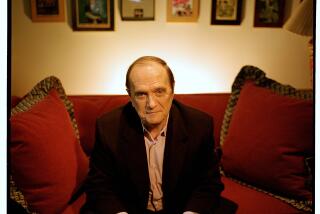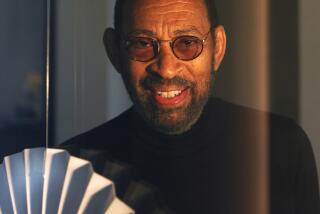Phineas Newborn Jr.; Jazz Artist Noted for Piano Skill
- Share via
Phineas Newborn Jr., a celebrated jazz pianist widely praised for his flamboyant technique, died Friday in a Memphis hospital.
Once the toast of aficionados around the world, Newborn, 57, suffered from cancer. Because of his health, had been performing only in the Memphis area.
Newborn, who also played trumpet, tenor sax, French horn and vibraphones, was once lauded by critic Nat Hentoff for having “more command of the piano technically than any of his jazz contemporaries,” while Ralph Gleason said in the 1950s, “He is one of the most impressive pianists to emerge in recent years.”
Decline in Career
In the 1960s, however, his career declined because of an emotional illness that at one point confined him to a California state hospital.
Newborn’s father led rhythm and blues bands and his mother sang and played piano. A brother, Calvin, who survives him, is a guitarist.
In the 1950s, he emerged from his father’s shadow into the contemporary jazz scene. After glowing reports on his work from Count Basie and jazz writer-producer John Hammond, he went to New York City, where he was compared to Art Tatum and Oscar Peterson for his technique.
He worked there with his own trio and quartet and later toured Europe with bassist Charles Mingus. In 1959 he made a film with Mingus, “Shadows,” a John Cassavetes production that examined life as experienced by a black living in Manhattan.
Los Angeles Appearances
Despite periodic bouts with mental illness, Newborn continued to play and record in the 1960s. He spent part of that decade in Los Angeles, where he was heard at several jazz clubs.
Reviewing one of his albums in 1962, Pete Welding wrote that “Newborn’s assured and mature conception, the deepened emotional thrust of his playing and the unfailing sense of ordered direction that course through his work . . . (are) marked by a passionate intensity and a healthy emotional spontaneity.”
But by 1987, his illness had a noticeable effect on his playing. Leonard Feather, The Times jazz critic who had earlier praised his magnificence, wrote from a Montreal festival that Newborn “was less than a shadow of his early self; it seemed painful for him to reach for a chord, as if he were climbing up a staircase in the dark.”
Newborn, who also is survived by a son and two daughters, also composed works that include “New Blues” and “Theme for Basie.”
His recordings include “The Great Jazz Piano of Phineas Newborn Jr.,” “Please Send Me Someone to Love” and, as a sideman with Howard McGhee, “Maggie’s Back in Town.”
More to Read
The biggest entertainment stories
Get our big stories about Hollywood, film, television, music, arts, culture and more right in your inbox as soon as they publish.
You may occasionally receive promotional content from the Los Angeles Times.







